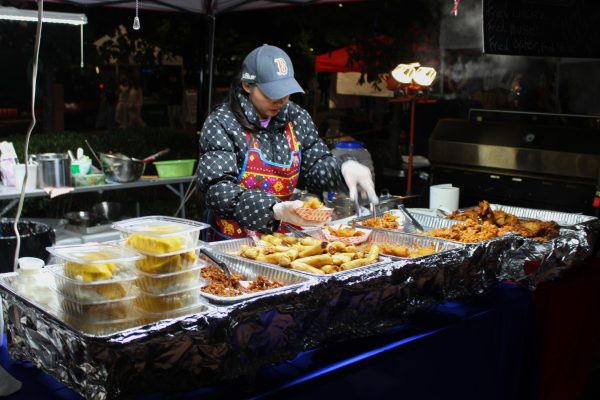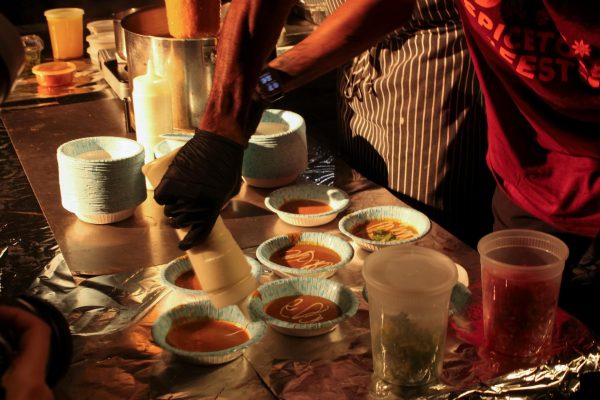A variety of rich fragrances from curry to kimchi wafted through City Hall Plaza at BostonÔÇÖs first Spicetober Fest. The event, which took place last weekend, provided entertainment and mouth-watering cuisine like Filipino egg rolls and jerk chicken, Argentinian empanadas, and Asian barbecue. Alongside food, Spicetober Fest blended cultures through music, crafts, and clothing, all of which were supplied by festival vendors.┬á
ÔÇťThe requirement [for the vendors] was something spicy and something local,ÔÇŁ said Kathryn Fatemi. ÔÇťAt the Williams Agency, we love spicy food and having celebrations that have culture and flavors,ÔÇŁ she added.┬á

The Williams Agency organized the event and is part of The MayorÔÇÖs Office of Arts and CultureÔÇÖs new plan to fund ÔÇťfree festivals, performances, workshops, and more on City Hall Plaza for all to enjoy,ÔÇŁ according to an article on the City of Boston website regarding this year’s programming efforts.┬á
The festival featured cultural fare from across the globe, including the Caribbean, India, Jamaica, and the Philippines, with an emphasis on local vendors. Nicola Williams, creative director and producer, and Fatemi, marketing and events manager, made the event free for vendors to promote their local small businesses. 
The plaza hosted a plethora of stands, offering refreshments for those needing a break from the spice. From fresh Ethiopian coffee to Thai iced tea, there was something for everyoneÔÇÖs taste buds.┬á
Every hour of the event, varying chefs hosted cooking demonstrations. One of those demonstrations was executed by Claire Cheney, founder of Curio Spice Co., a women-owned spice blend company.
Curio Spice Co. offered samples of an aromatic cider during their demonstration. The warm beverage was bursting with cinnamon and nutmeg, the kind of flavors that make you want to cozy up next to a fire on a chilly nightÔÇölike autumn in a cup.
Cheney and her team brought hundreds of spices to the event, all sourced directly from small, sustainable farms around the globe to support spice farmers. For the demo, they made a spice blend with the audience. They accomplished this by passing out spice wheels to every audience member before mixing and blooming themÔÇöa culinary technique that involves heating spices in a fat to bring out their flavors.
Spice wheels demonstrate how spices are grouped aromatically. They have the same appearance as color wheels, but the outer ring of the wheel has different spice names, ranging from saffron to curry leaf. The middle ring describes the intensity and nuance of the spices. The inner ring describes the flavor and aroma of the spices on the outermost ring. At the end of this spice lecture, Cheney gave the blend to audience members to sample and bring home. 
Another vendor at the event was Blind Squirrel Sauces, a Rhode Island-based business co-founded by husband and wife Bruce and Patti Cousineau. The story behind why the pair started the business started by chance. One night, they were having tacos, and Bruce decided they needed a hot sauce, so he whipped one up on the spot. According to Patti, her husband never writes anything down. This time, however, he took note of the entire recipe, and it hasnÔÇÖt changed in the five years since. There are three variations of the hot sauce: mild, medium, and hot.┬á
Patti shared that, when the festival organizers asked the couple to be vendors, they were overjoyed because they hadnÔÇÖt expanded their business much into Massachusetts yet. Their products are currently in 20 stores throughout New England.
The CousineausÔÇÖ hot sauces werenÔÇÖt the only ones on sale at Spicetober Fest. New Entry Sustainable Farming Project, a nonprofit farmer training program based in Beverly, was also in attendance.┬á
ÔÇťWe felt like Spicetober Fest was a great way to feature our program and our hot sauces,ÔÇŁ said Jennifer Hashley, the director of New Entry Sustainable Farming Project. ÔÇťWe help folks who want to start businesses. We help them with marketing their products, and we also run a food hub.ÔÇŁ
New EntryÔÇÖs food hub aggregates and distributes the produce that farmers grow. Their most popular plant? Hot peppers. New Entry also has a ÔÇťFresh & LocalÔÇŁ license plate program that helps to support the Massachusetts Federation of Farmers’ Markets and the Beginning Farmer Network of Massachusetts. Proceeds from each license plate purchase provide funding to train new farmers, continue the flow of local farm produce to consumers, and protect farmland.┬á
Hashley explained that they canÔÇÖt always distribute the hot peppers, so they decided to make hot sauces to sell instead because ÔÇťa lot of people love hot sauce.ÔÇŁ
While people enjoy hot sauce, jerky is another popular spicy snack. One of the most delightful bites of the night was a piece of beef jerky from Three Gingers Jerky. Unlike normal jerky, which can be dry, it was moist and perfectly spiced with a Japanese blend of umami and sesame. 
The tempered heat lingered slightly, but in the best way possible. Those of all heat tolerances would likely enjoy this take on beef jerky immensely.
Following all of the spice blends, live music, and food education, the event culminated in ÔÇťComedy on Fire!,ÔÇŁ a painstaking saga between comedians and their demise: spicy chicken tenders.
ÔÇťEach comic downs a hotter tender, then tries to deliver a one-minute set without crying, puking, or quitting. If they go for the milk, theyÔÇÖre out,ÔÇŁ according to the rules on the Spicetober Fest website.
The chaotic comedy smackdown concluded with blood, sweat, and tears shed from each competitor. In the end, comedian Anne-Marie Keene took the win, after delivering her comedy set with grace despite her mouth being ablaze. 
Though the showcase gave the audience plenty to feast their eyes on, the most magnificent dish of the night came from Chef Chris Faison, a contestant on the currently airing 24th season of Hell’s Kitchen. During his chef demo, he crafted a charred curry pumpkin soup with coconut lime cream on topÔÇöbecause itÔÇÖs pumpkin spice season, of course, and this festival is all about spice.┬á

From master chefs and sweating comedians to homegrown hot peppers, the night provided a myriad of opportunities to learn about a vast array of different culturesÔÇöand taste them too.